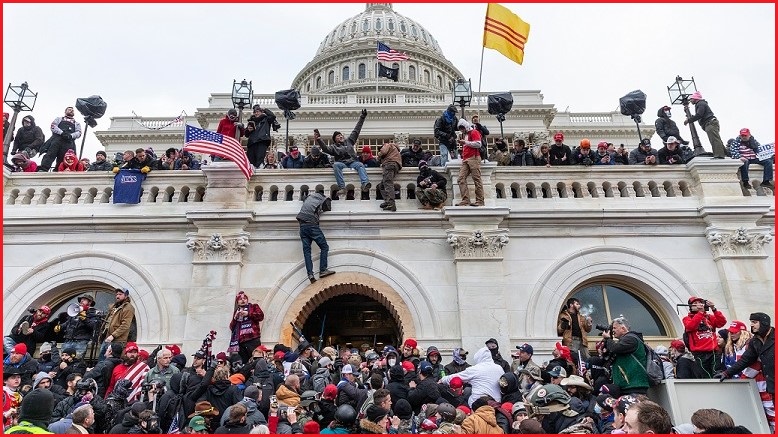This week’s US presidential inauguration has put US authorities and social media giants on high alert as they work to avoid a repeat of the US Capitol riots amidst warnings from cyber security experts that such an event would be “fairly easy to incite and amplify” online.
Authorities have been combing social media platforms for details of “concerning” potential attacks that might accompany the controversial inauguration, with the FBI warning of possible armed protests and leaning heavily on protestors’ own social media posts to track down and charge hundreds of offenders.
With millions of radical conservatives flocking to alternative social media platforms and turning platforms like Gab and Parler into hotbeds of conspiracy theories, reports suggest that online commentators have labelled journalists “soft targets”.
Concerns of a repeat have been riding so high that Twitter, in justifying its lifetime ban of US President Donald Trump, even cited his pronouncement that he would not be at the inauguration as potential “encouragement to those potentially considering violent acts that the Inauguration would be a ‘safe’ target.”
Yet the clampdown on social media has not been without its own controversy: one columnist noted the “incoherence” of Twitter’s ban and asked whether it is “worrisome that [Twitter founder] Jack Dorsey, a weirdly laconic billionaire with a castaway beard who has never been elected to any public office, is able to make unilateral, unaccountable decisions that may help determine whether our country survives or self-immolates”.
Although the ban was “the right decision”, Dorsey wrote, he noted the “real and significant ramifications” of the ban, which he labelled “a failure of ours ultimately to promote health conversation.”
The current, combative environment is “a time for us to reflect on our operations and the environment around us”, Dorsey said. “Our goal in this moment is to disarm as much as we can, and ensure we are all building towards a greater common understanding.”
Too little, too late
Dorsey’s Trump ban may have driven soul-searching at Twitter, but it’s far from enough to secure an online space where “this type of violence is fairly easy to incite and amplify, and can be used by sophisticated and unsophisticated actors altogether,” Katie Moussouris, founder and CEO of security firm Luta Security, noted during a recent Aspen Institute webinar in the wake of the Capitol riots.
Long before those riots eventuated, she said, authorities “had ample evidence already of this kind of destabilisation at a massive level, and galvanising of folks who have extremist views, and the grooming of extremists and cultivating of additional extremists.”
Fighting online misuse of social media platforms would be a considerable and ongoing challenge moving forward, Moussouris said, warning that efforts to keep violent and extremist behaviour in check required regulation not of the technology – which is “not something we can narrowly define such that we can appropriately regulate those things” – but of the people using it.
“It’s regulation of the behaviours and what you do with them,” she said, noting that authorities needed to make sure that “these norms conversations have that nuance that it’s not the technology… but the behaviour that we all enact as a global community that hope to preserve order in the world in general.”
US senator Mark Warner, who serves as vice chair of the US Senate Intelligence Committee and was caught up in this month’s Capitol riots, branded the social media giants “collaborators… who allow this kind of disinformation from foreign sources and outright lies”.
The social media giants’ “eleventh-hour conversion to now suddenly take down Twitter and Facebook feeds,” he said, “is way too little, too late”.
Referring to cyber security firm Mandiant founder Kevin Mandia as “patriots” for leading the long-running compromise of the SolarWinds security tool – which was allegedly used by Russian operatives to infiltrate US businesses and government agencies – a “pretty damn angry” Warner lashed out at the social media giants.
“What Kevin and his firm did was as patriotic an action as I’ve seen from any enterprise for a long, long time,” Warner said, “and we own him and his firm a debt of gratitude.”
Arguing that America’s system “is under full frontal assault,” Warner said that “if [social media firms] had even one ounce of the patriotism that [cyber security specialists], we wouldn’t be in this position.”
Moussouris was hopeful that the new Biden administration would approach the issue on the front foot – enabling “considering what kind of norms we want to exemplify in the world with our own behaviour” and guiding the online community towards a more productive level of online engagement.
“We lost time with the disorganisation of the previous administration and its lack of focus,” Moussouris said, “and being in denial of what we’re up against, cyber security-wise, as a nation. It’s really high time, and I have a lot of hope that we can start getting it right again.”










